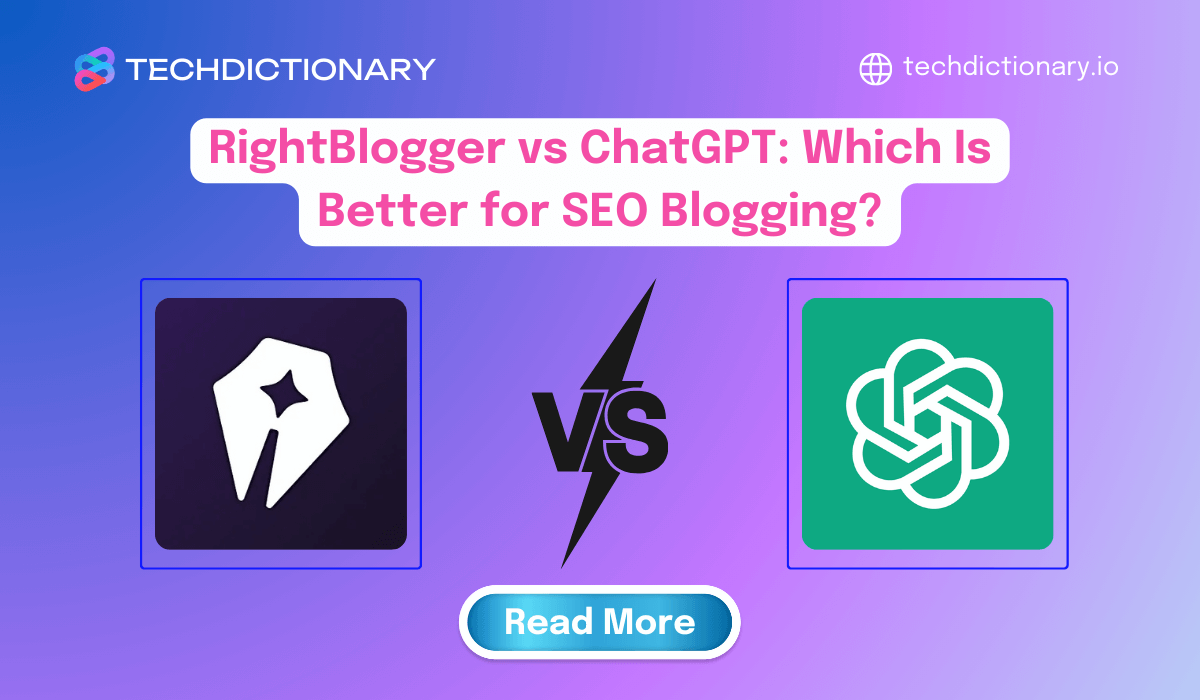
Are you exploring AI writing tools for blogging? If so, you might be curious about RightBlogger and ChatGPT. Well, both can help you create content, but in different ways. As you’ve arrived here, let’s break down the differences between them, understand their features, and choose the best fit for your writing style and goals.

RightBlogger’s Homepage
RightBlogger might be new to many of us. Generally, this tool is specifically designed for bloggers, helping them create high-quality content without too much effort. Specifically, it has over 80 specialized tools, ranging from blogging tools like AI article writing to social tools like YouTube video description, making it a strong assistant for many marketers.
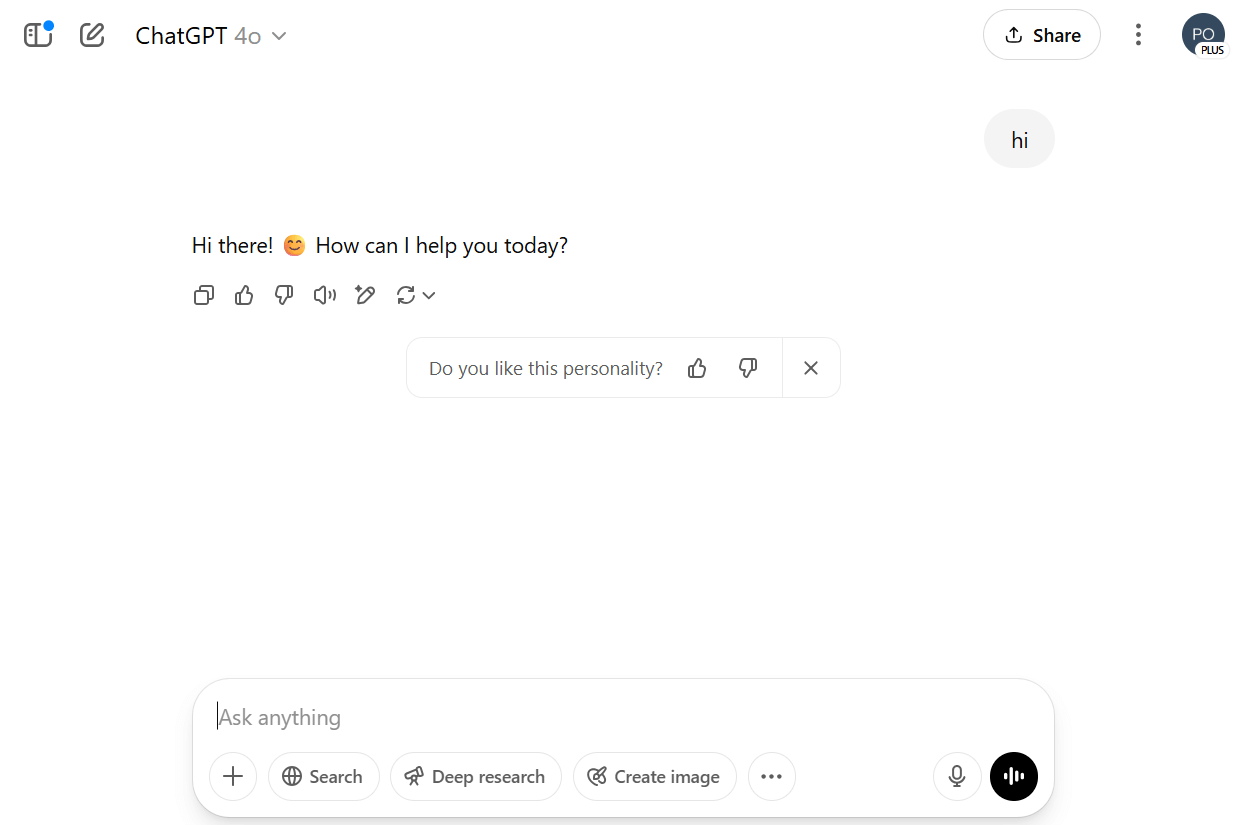
The Interface of ChatGPT
ChatGPT is a familiar name. Developed by OpenAI, this chat-based AI excels at answering questions, generating content, and conducting research. It’s a perfect (and widely used) option for creators, students, and professionals alike, though it may require a bit more engagement to get the exact results you want.
Now, it’s time to put these two writing tools into comparison. Before diving into details, have a quick look at the summary below:
| Feature | RightBlogger | ChatGPT |
| AI Article Writing | Fast, template-based generation | Flexible, needs detailed prompting |
| SEO & Keyword Tools | Built-in SEO assistant | Requires manual SEO prompt setup |
| Customization | Limited to templates | Highly customizable via prompts |
| Ease of Use | Beginner-friendly interface | Requires learning prompt writing |
| Extra Capabilities | 80+ tools for creators | API access, GPTs, and plugins |

RightBlogger’s AI Article Writing
Belonging to the “Blogging Tools” niche, the AI Article Writer from RightBlogger is an amazing assistant designed for bloggers and content marketers who want to create fast, SEO-friendly articles. You just need to enter a keyword or topic, and it will generate a complete article for you. It also comes with organized headings, places for images, and links to other resources.
Not just that, this tool lets you customize things like tone, writing style, article length, and perspective. Plus, you can specify your target audience and manually include relevant sources or references to improve article accuracy. That’s it! No advanced writing skills are required to create a high-quality article!
How about ChatGPT? In fact, this platform doesn’t come with a built-in blog article generator. Instead, you’ll need to guide it step-by-step with detailed prompts to produce a blog post. As you might realize, it’s perfect for creativity. You can tell ChatGPT to generate articles on any topic and format. However, it can be time-consuming and requires a bit of experience to achieve your desired results.
You may be interested in:
GravityWrite vs ChatGPT (2025): Which is the best AI Writing Tool?
Copy AI vs ChatGPT (2025): Which is the best AI Writing Tool?
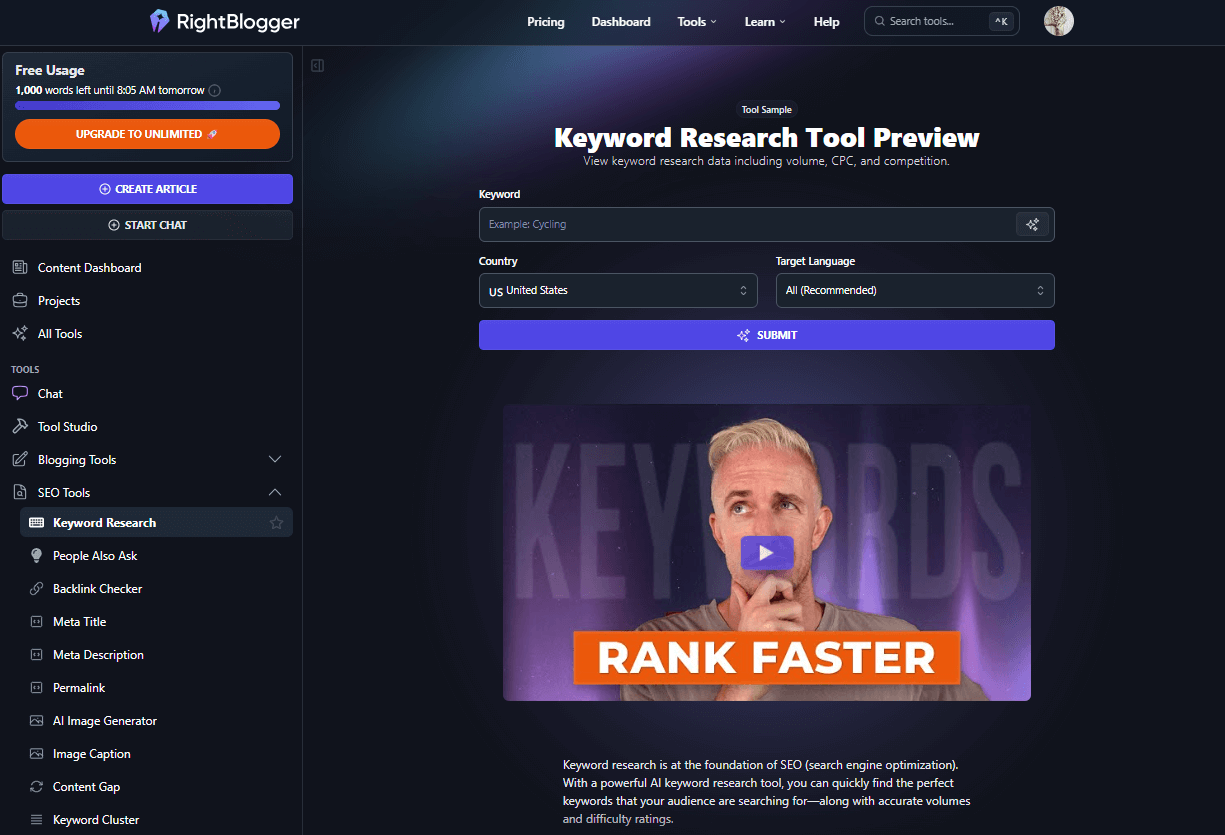
RightBlogger’s SEO Tools
When it comes to SEO, you might be impressed by RightBlogger’s built-in tools. This platform offers a wide range of features, including keyword research, automatic linking (both internal and external), and helpful suggestions for SEO-friendly titles and meta descriptions. This way, you can ensure that your content is optimized to rank on search engines, even if you’re not an SEO expert.
In contrast, ChatGPT lacks these dedicated SEO features. It can provide SEO-friendly tips (if you ask for them), but you’d need to manually incorporate keywords, add links, and optimize metadata. So, while it offers flexibility, you still need to take responsibility for SEO knowledge and implementation.

RightBlogger Outline Editing
With RightBlogger, you can make some customization. For example, you can easily change the writing tone and point of view, edit the outline, and even create presets for different content types. This is particularly useful for content teams or solo creators who want to maintain brand consistency while speeding up the writing process.
ChatGPT, on the other hand, allows for deeper customization and creative control. You can mimic various tones, imitate popular writing styles, and request specific perspectives through detailed prompts. While it doesn’t offer traditional built-in templates, users can access or create custom GPTs — personalized AI assistants — that serve as reusable presets for blog writing, SEO, and more. This flexibility is powerful, but it may take more time and experimentation to get consistent results.
When it comes to user-friendliness, RightBlogger is built with beginners in mind. Its clean and intuitive interface is perfect for most users. You can easily publish directly to platforms like WordPress, Ghost, and Webflow, plus use embedded lead magnets to grow your email list. It’s designed as a plug-and-play solution, ideal for quick publishing.
ChatGPT is easy to get started with — you simply type in prompts and receive responses within seconds. However, using it effectively for structured blog writing or SEO tasks requires more experience and prompt crafting skills.
Unlike some blogging tools, it doesn’t integrate directly with content management systems, so you’ll need to copy the content manually into your editor and handle media uploads yourself. While ChatGPT offers advanced capabilities through plugins and APIs, these features are better suited for experienced users or those with technical knowledge.
RightBlogger stands out with unique features like automatic embedding of images and videos, support for multiple languages (over 113!), and a Tool Studio for creating custom lead-generation tools. As mentioned, with its 80+ specialized tools, RightBlogger is a comprehensive content creation hub for any marketers and content creators alike.
In comparison, ChatGPT supports advanced research, file uploads, image generation, and even voice mode (currently in beta). It’s a versatile tool that goes beyond writing, making it ideal for those seeking a broad AI assistant for creative and technical tasks. However, its general-purpose features aren’t specifically tailored for bloggers.
You may be interested in:
Wordtune vs ChatGPT (2025): Which is the best AI Writing Assistant?
Grammarly vs ChatGPT: Which is better for proofreading in 2025?
|
PROS |
CONS |
|
| RightBlogger | ✅Built-in SEO tools (keyword research, internal/external linking, etc)
✅One-click blog generation and publishing ✅80+ tools (Video-to-Blog, lead magnets, etc.) ✅Beginner-friendly interface ✅Automatic media embedding ✅Presets for tone and article types |
❌Limited customization beyond templates
❌No automation for bulk publishing |
| ChatGPT | ✅Highly customizable outputs with detailed prompts
✅Supports advanced tasks like file uploads, image/voice generation, deep research ✅API access, plugins, and custom GPTs ✅Great for broader creative/technical use |
❌No built-in SEO tools or CMS integration
❌Requires strong prompting skills ❌Can be time-consuming for blog generation |
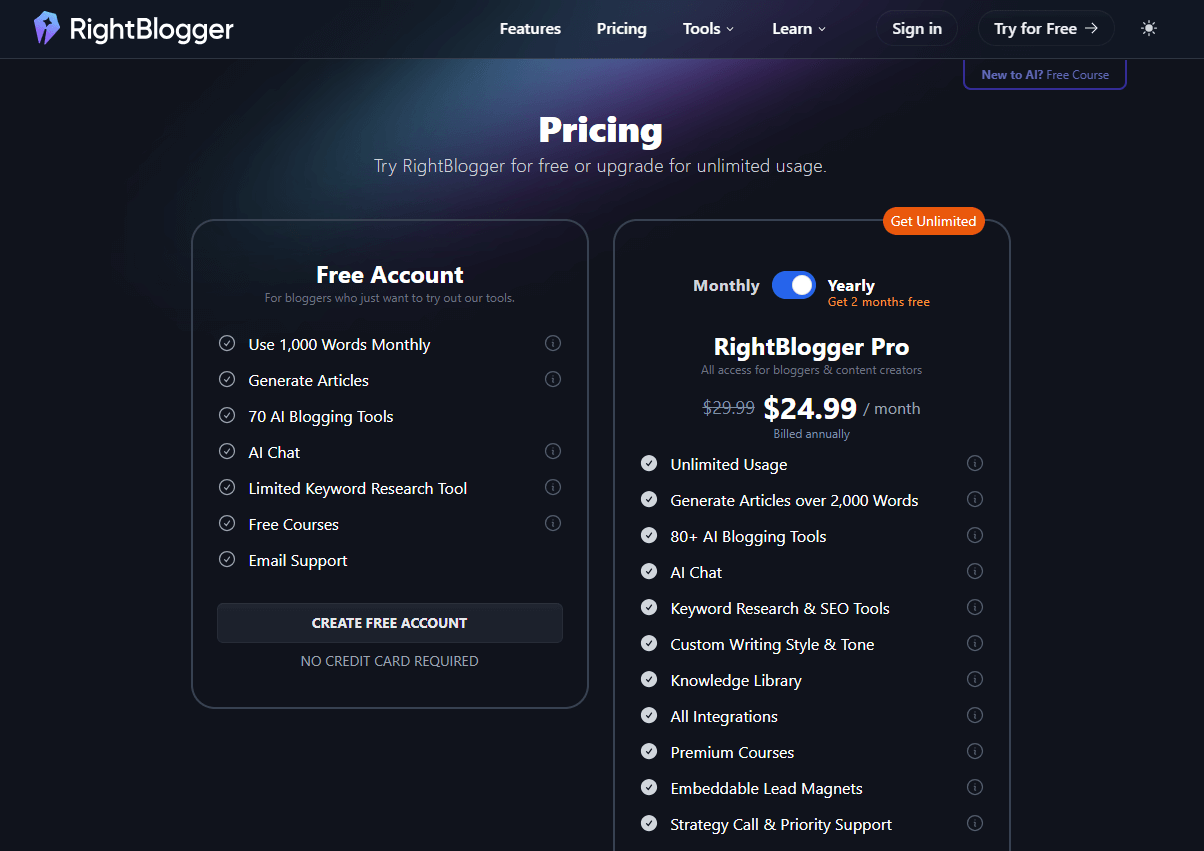
Pricing Plans of RightBlogger
Currently, RightBlogger offers two different options for users:
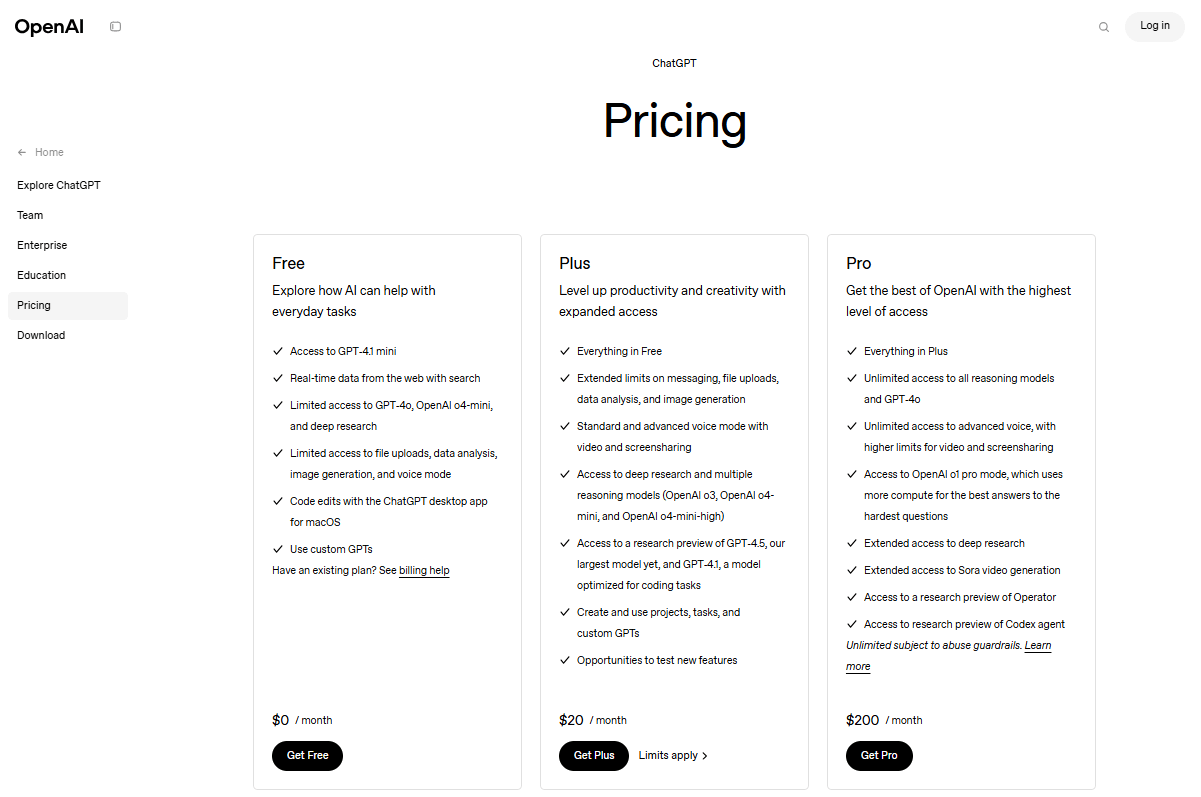
ChatGPT’s Pricing Plans
ChatGPT offers more flexible choices:
In short, RightBlogger offers a more specialized blogging experience at a similar price point, while ChatGPT provides broader flexibility for a slightly lower cost
When it comes to selecting an AI article writing tool, it’s essential to find one that fits your unique content needs. If you want to make the right choice, don’t skip these five friendly tips:
You may be interested in:
Writesonic vs ChatGPT: Which is the best AI Writing Tool?
QuillBot vs. ChatGPT: Which is Better for Paraphrasing in 2025?
So, RightBlogger vs ChatGPT, have you chosen your ideal writing assistant? In short, if you want quick, SEO-friendly content, RightBlogger is a fantastic option. On the other hand, if you want more creative freedom and are open to learning how to write effective prompts, ChatGPT is a good choice. Think about your goals and choose the tool that will help you reach them efficiently! Or else, you can browse TechDictionary to find ideas for other tools that help.
You may be interested in: Anyword vs ChatGPT: Which is the best for Writers in 2025?
RightBlogger uses templates designed for blog writing and comes with handy SEO tools. In contrast, ChatGPT is a comprehensive AI tool that requires you to provide prompts to generate content.
Absolutely! Using ChatGPT to write blogs is legal. Just make sure to review and edit the content to maintain originality and follow copyright guidelines.
ChatGPT can assist with SEO by generating meta descriptions, suggesting keywords, and optimizing content – if you prompt it correctly. While it’s not specifically designed for SEO like RightBlogger, it can be incredibly effective when used well.

